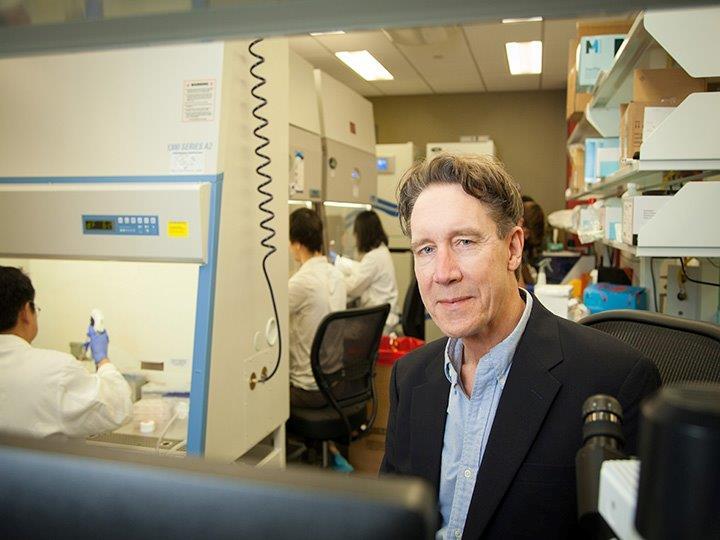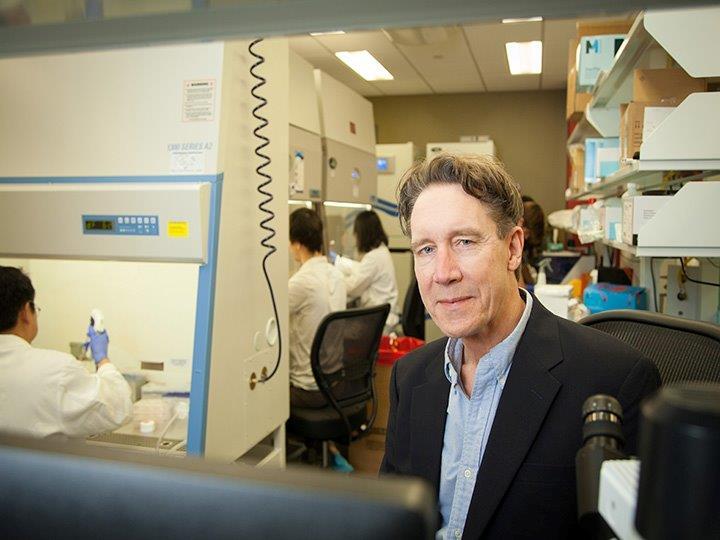
Credit: University of Houston
A cancer researcher at the University of Houston is set to deliver an unprecedented look at the 20-year development of esophageal cancer that starts with a precancerous lesion known as "Barrett's esophagus," a condition present in 3-million Americans. Frank McKeon, professor of biology and biochemistry and director of the Somatic Stem Cell Center at UH, received a $900,000 grant from the National Cancer Institute for the work.
It's an especially important find for esophageal cancer, which is one of the most aggressive forms of cancer with five-year survival rate in the teens. "We really don't know how to manage it, so we need to get at it at these earlier stages to see if we can address it in a pre-emptive way," said McKeon.
Fortunately, only a small fraction of Barrett's patients progress to the more serious stages of dysplasia and then malignant esophageal cancer.
"The problem of Barrett's esophagus underscores a critical need to identify why some cases progress and others don't, as well as the need for drugs that eliminate this precursor lesion years before it ever thinks about progressing to serious disease," said McKeon.
McKeon, one of the nation's leading experts in stem cell cloning, says precancerous cells are just like people. Some of them, he says, just make bad decisions, resulting in their progression to dysplasia and then malignant cancer. Importantly, there are genetic warning signs that some of these precancerous lesions are about to get out of control and McKeon says these are the signs that must be understood.
Nowhere is the precursor warning more evident than in the time between a diagnosis of Barrett's esophagus and the development of esophageal cancer.
"We know epithelial cancers take 20 or 30 years to develop, and this is one of the few cancers where you can see all the stages," said McKeon. Not only can he see them, he can clone the stem cells representative of all stages along the development of cancer.
From a pathology standpoint, Barrett's esophagus is "metaplasia," or unusual growth of tissue that is present in the wrong anatomical location. In the case of Barrett's, the precancerous tissue resembles intestine. There are three potential stages of Barrett's: the disease itself, Barrett's with dysplasia, which has genetic abnormalities causing greater risk of cancer to patients, and adenocarcinoma, or malignancy. Ninety percent of patients diagnosed with Barrett's esophagus will never develop dysplasia.
McKeon advanced his technology for cloning normal stem cells found in organs such as intestine, pancreas and liver, and adapted it to cloning stem cells from Barrett's esophagus.
"We can clone the stem cell component of each of those stages leading to esophageal cancer, and that's very exciting," said McKeon. "This is really unprecedented."
McKeon waxes archeological about his ability to collect and clone normal cells, dysplasia cells and malignant cells, all in succession within the same patient.
"It's almost like going after the city of Troy. You have all the other cities built before and after, and it gives you a sense of the evolution," he said.
According to McKeon, it's the exact model needed. "The absence of reliable, patient-specific models in cancer biology has been a chronic impediment to understanding heterogeneity, progression, metastasis and chemotherapy resistance," he said.
Unless dysplasia is present in Barrett's esophagus patients, they will not qualify for ablation, the current course of treatment, which kills precancerous cells but can cause severe problems, including burning and strictures that can collapse the esophagus.
"So there's three-million Americans thinking, 'I have this smoking gun in my esophagus, and if it doesn't progress there's nothing for me to do but worry about it progressing,' " said McKeon. "But if we can get ahold of the stem cells for these diseases early, we can screen for drugs that will selectively kill them before they evolve into cancer."
His goal is to identify drugs to quash Barrett's esophagus at any stage.
McKeon thinks the same treatment will work to treat patients at risk for gastric cancer. Barrett's esophagus is rare in Asia, but a similar metaplasia, caused by Helicobacter pylori (H. pylori) bacteria, commonly exists in the stomachs of Asian patients eventually diagnosed with gastric cancer.
"In looking at the stem cells for Barrett's and the stem cells for gastric intestinal metaplasia, they are identical," he said. McKeon predicted the work will be applicable to all epithelial cancers, which comprise 80 percent of all cancers diagnosed.
###
On this project McKeon works with his wife, Wa Xian, a professor at the University of Texas Health Science Center at Houston, and gastroenterologist Jaffer Ajani from the University of Texas MD Anderson Center in Houston.
Media Contact
Laurie Fickman
[email protected]
713-743-8454
@UH_News
http://www.uh.edu/news-events
Original Source
http://www.uh.edu/news-events/stories/2017/december/12062017Frank-McKeon-%20Tumor-Barrets.php





